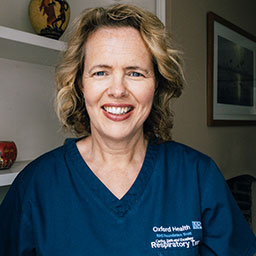Overview
Living with unrelenting breathlessness can cause individuals significant physical, emotional, social and economic negative impact to their lives. Often, patients are supported by their life partners or family members who help manage complex medication and oxygen regimens. Increasing breathlessness can cause fear and anxiety for both patient and caregiver, calling upon the Community Respiratory Nurse Specialist (CRNS) to offer practical and emotional support and guidance, in their role of supporting people with respiratory disease. However, supporting patients who have distressing and difficult to treat symptoms impacts the nurses caring for them too. Repeated exposure to the distress of others, is associated with increased stress and burnout on the nurse.
Coping with the distress of others requires “emotional labour”: a recognised consequence of caring that can be experienced by the individual nurse. This has been particularly apparent during the COVID-19 pandemic where nurses have witnessed grief and loss both personally and professionally. Engaging with the distress of others however can also build trust and enable a closer relationship between the nurse and patient, ensuring the patient receives best supportive care. It is therefore an important, yet challenging component in patient care and might impact the care delivered by the nurse.
To witness breathlessness, something so life sustaining and fundamental to our survival as human beings, is to witness distress. When exposed to the distress of others, there is likely to be a personal emotional cost to the CRNS which may then influence the care they give their patients. It might, because of their own feelings, influence the care they give their patients.
Project aim
This is an unexplored area of research in respiratory nursing. The aim of this project is to reveal new understanding of the lived experience of CRNS’s supporting patients with breathlessness, how they make sense of these experiences and how they impact them personally, examining the consequence for patient care. This will seek to advance understanding in the impact of emotional labour on effective nursing care.
This is a Hermeneutic phenomenological study using video interviews with 12 CRNS seeking to explore the lived experience of supporting patients with breathlessness. Hermeneutic phenomenological methodology was used to unconceal taken for granted understanding using Crafted Stories, and using the philosophy of Heidegger, interpretive analysis explored the data to reveal new understanding.
Applying the study in practice
The interpretations generated from the data will be used to provide guidance for core standards of support and education for CRNS. This will contribute to an underexplored area of research and will directly benefit patients who have breathlessness, by enabling well supported CRNS’s to address the holistic needs of their patients. At a time of likely increased demand for respiratory services, ensuring nurses are well supported in their care of people with breathlessness might avoid inevitable escalating costs and reduced quality of life.
This research will hopefully contribute to the way we understand the challenge for all nurses witnessing distress, bringing new understanding of this unexplored area of knowledge. Although this research is focused on Respiratory Specialist Nurses, this is a bigger issue and has relevance to all nurses. I would like the opportunity to develop this within Oxford Health.


